Home » Articles posted by Karen Newbery
Author Archives: Karen Newbery
FOLIO@Duke Newsletter v. 4 no. 1

Local Update
Project Changes
As mentioned in Deborah Jakubs’ letter to all Duke Libraries’ staff dated January 25, 2022, the Duke University Libraries’ Executive Group has set a firm go-live date to fully switch to FOLIO by July 2023. The project teams are excited to have a firm deadline so that we can make our plans appropriately. It was also announced that beginning in February 2022, that DUL has contracted with Index Data for full project management of our implementation. Index Data also provides hosting services for the three Duke instances of FOLIO (development, test, and production). Mike Gorrell, Director of Operations will be leading our project. Mike has years of experience with software and libraries. He formerly held executive-level positions at EBSCO in their Publishing branch, and was the Executive Vice President and Chief Information Officer at EBSCO Information Services. He has held positions in the FOLIO Technical Council, and is currently chair of the FOLIO Community Council. The project management responsibilities that Mike will provide to DUL include:
• Scheduling and running meetings
• Establishing and managing schedules
• Identifying and leading the mitigation of project risks
• Communicating status
• Consulting with management on alleviating bottlenecks
• Coordinating dry runs, tests, gap analysis/workaround planning
• Significant, consistent, and detailed documentation
On February 7th, the Library Service Platform Steering Group (LSPSG) met with Mike. Mike shared with us his preferences in managing a project timeline, meeting minutes, and meeting schedules. He suggested three, six, and nine month goals focusing on analysis of gaps, figuring out workflows, and working on integrations with essential applications outside of FOLIO. He recognized that we’ve already done a lot of work on our local implementation, and looks forward to working with us.
Juniper Release
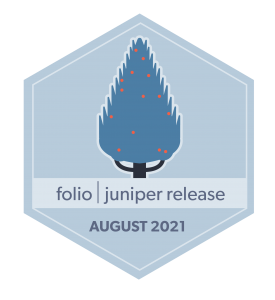 Library Systems and Integration Support staff have been working with Index Data staff to prepare our three local instances for the upgrade to the Juniper release. We will be re-loading data from Aleph into our Juniper development instance. We will also pull the FOLIO-born item records that have been created for the Courses app from production into development. As we move through the process of updating our servers, we will make sure that the Inventory data is up to date from Aleph as well as production Courses data. A big bonus for having individual apps is that they each have their own storage! We’ll be able to pull the data from the production instance of the Licenses app into our development and test instances too, so we can verify that all the data is correct before we upgrade the production instance. We’re currently working to upgrade the test instance beginning the week of February 7 and will invite our local testers to check functionality and validate data before we move on to upgrading the production instance in mid-February.
Library Systems and Integration Support staff have been working with Index Data staff to prepare our three local instances for the upgrade to the Juniper release. We will be re-loading data from Aleph into our Juniper development instance. We will also pull the FOLIO-born item records that have been created for the Courses app from production into development. As we move through the process of updating our servers, we will make sure that the Inventory data is up to date from Aleph as well as production Courses data. A big bonus for having individual apps is that they each have their own storage! We’ll be able to pull the data from the production instance of the Licenses app into our development and test instances too, so we can verify that all the data is correct before we upgrade the production instance. We’re currently working to upgrade the test instance beginning the week of February 7 and will invite our local testers to check functionality and validate data before we move on to upgrading the production instance in mid-February.
Team Work
The Implementation teams took the liberty of a low-meeting December to take a break and are getting back to work on FOLIO now.
The Resource Access implementation team has been focusing on creating FOLIO circulation rules. They are also considering how to handle long-overdue items that still have active loans. When we move loans into FOLIO, we will use the new FOLIO circulation rules and will check the items out in FOLIO. We do not want these long-overdue loans from Aleph to become new loans, so the RA implementation team is considering how best to handle this issue, and maybe take on a clean-up project.
The Resource Management implementation team is reviewing the Receiving app and considering the need for prediction patterns for serials. The FOLIO community originally did not prioritize print serials management since many institutions are no longer ordering the volume of serials Duke is. Only recently has the community revisited this feature. There are other institutions who have voiced the need for print serials management, and members of the LSPSG are reaching out to those other institutions in hopes of a collaboration to address this need.
The Metadata Management implementation team has been focusing on the data clean up projects. When they begin meeting again, Matt from LSIS will be joining the team and taking on some of the business analyst tasks that had been done by Jackie before her departure from LSIS and Duke. They will have some new features to explore, including the new search functionality and improved Data Import app. Juniper introduces the behind-the-scenes work for storing links to bound-with materials. LSIS has scripted the loading of the bound-withs, but they won’t be viewable through the user interface until we upgrade to Kiwi.
Peers
Deborah mentioned in her letter that some of our peer institutions have implemented FOLIO. Cornell went live with all the FOLIO apps in July 2021, Texas A&M switched in December 2021, and the University of Chicago switched in January 2021. Other institutions that have gone live in the last year include the University of Colorado Boulder, Skidmore University, and Spokane Public Library. The world is watching our implementation. Occasionally, other institutions reach out to Duke staff to learn more about the project and our implementation. We’ve spoken to libraries in California and Australia in just the last month!
International Update
List of release names and planned dates of release for the next 18 months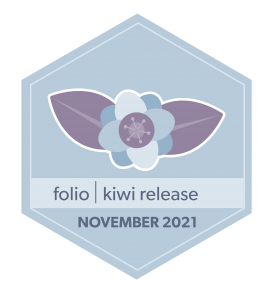
| Release Name | Release Number | Expected Month of Release |
| Kiwi | Release 3 2021 | Released January 2022 |
| Lotus | Release 1 2022 | April 2022 |
| Morning Glory | Release 2 2022 | August 2022 |
| Nolina | Release 3 2022 | November 2022 |
| Orchid | Release 1 2023 | March 2023 |
The international project continues to move forward in adding features and back-end support for those features. The Product Council assigned a group to consider the next version of a roadmap document. Karen is a member of the Roadmap Group. The group began by grouping work in themes such as data import, data consistency and integrity, dashboard functionality, self check, and bulk edit. There were also sub-themes that were considered such as under bulk edit, user bulk edit, acquisitions bulk edit, and inventory bulk edit. There is a new project in the FOLIO Jira site for the roadmap, and the group linked existing Jira issues (work that the SIGs and developers are planning or working on) to the roadmap themes and subthemes so that an overall picture could start to be created of the work that is currently being done and the work that is upcoming. The next steps in the roadmap group is to involve product owners and the SIGs to contribute to the roadmap and to create an easy to understand snapshot for sharing on the folio.org site.
The Community Council is preparing for a membership drive. The roadmap snapshot will be an important document to share with newcomers to the FOLIO project. The international project is always looking for product owners, developers, and reporting developers, as there’s still lots of work to be done!
Watch This
Agenda:
- Community Council update
- Product Council Update
- Tech Council update
- WOLFcon update
- FOLIO.ORG Website update
Bee Facts
It’s winter in North Carolina, so soothe your throat with homemade honey cough drops.
FOLIO@Duke Newsletter v. 3 no. 3
Local Project Updates
Data Clean Up Project – As mentioned in the last newsletter, we’re focusing on our data this fiscal year. The Metadata and Discovery Services section and Library Systems and Integration Support department (LSIS) have worked together to define and script an extract of our data to sent to OCLC. OCLC will sync our title and holdings data and theirs, a process previously called reclamation.

Work on importing data into FOLIO continues with loading of closed order records. We’re also negotiating through feels and fines and requirements about any retention of those historical records.
The Juniper release was installed on our development server last week. LSIS and our stakeholders will validate the upgraded data and check our current workflows over the coming few weeks. There are some new features that will be important to the Courses app included in this release. Full release notes are available on the FOLIO wiki.
International Project Updates
Kiwi is on schedule to be released at the end of November. Kiwi introduces a new search algorithm, Elastic Search, in the Inventory module. Elastic Search will allow for faster retrieval of record sets and accurate counts of those record sets to be displayed. The previous search configuration gave estimated numbers in the result sets. With this switch to Elastic Search, facets for narrowing the results list will require more work and will be available again in a forthcoming release. Also coming in Kiwi is MARC holdings. Duke relies on MARC holdings, and it will be great
Search will allow for faster retrieval of record sets and accurate counts of those record sets to be displayed. The previous search configuration gave estimated numbers in the result sets. With this switch to Elastic Search, facets for narrowing the results list will require more work and will be available again in a forthcoming release. Also coming in Kiwi is MARC holdings. Duke relies on MARC holdings, and it will be great
Watch This!
For an update on our project plans for the remainder of this fiscal year, please view the slide deck linked below.
Bee Facts
It’s getting to be that time of year again, and now that we’re out and about more this fall, it’s likely some of us will come down with a cold. Honey and Lemon tea is an age-old recipe to help with sore throats.
FOLIO@Duke Newsletter v. 3 no. 2
Courses and Inventory apps live in production!
by Erin Nettifee
In June 2021, a small team launched Course Reserves in FOLIO, marking the second FOLIO functional area to “go live” in advance of our full launch in 2022.
The project began in Summer 2020 when Mark Deutsch, former senior developer in LSIS, developed an LTI edge module for FOLIO. LTI stands for Learning Tools Interoperability, and is a common development standard for outside apps and tools to talk to learning management systems like Sakai, which Duke uses to support online courses. Chris Lorch in Learning Innovation helped to create an LTI tool in Sakai that used Mark’s new functionality to course materials on reserve automatically to students in their course in Sakai, along with the rest of their course content. That way students know which items the library has (electronic or print) that they can access for their coursework, potentially saving them hundreds of dollars.
In January 2021, a small group of Resource Access staff members – Jeremy Martin (Perkins), Andrea Loigman (Perkins,) Sarah Griffin (Music), and James Britt (Law) – came together with LSIS to carry out a project to deploy Courses for Duke in Summer 2021. With a long list of tasks to accomplish, the group met weekly to do things like learn how the Courses app works, develop new processes for putting items on reserve in FOLIO, and decide what data needed to be migrated from Aleph to Courses. While the group was focused on those tasks, Mark continued helping the project by migrating course information from Aleph into FOLIO, while Jeff Fleming worked on migrating Duke bibs, holdings, and items into our production instance of FOLIO so that they could be put on reserve when we went live.
With all members of the team involved, we were able to go live in mid-June, allowing staff at Perkins Library to support any summer term 2 courses and be ready to begin support for fall courses when faculty requests for course materials start coming in. The East Campus Libraries will join the Reserves effort in Fall 2021, and we look forward to supporting other interested schools after we go fully live on FOLIO in Summer 2022.
In addition to Courses going live this summer, we took on the project of updating the Top Textbooks page to use the FOLIO Courses data and to update the back end software used for that page. For the Top Textbooks program, the libraries purchases the titles for the 100 most enrolled classes at Duke, allowing students easier access to their course materials. Early in the pandemic, we turned off the previous Top Textbooks page that had been running on Simile. The new version uses Airtable. Many thanks to the Resource Access staff listed above for their work on updating the FOLIO data, and to Erin Nettifee and Angela Zoss for their work on developing and testing the resulting web page.
Local Timeline Change
by Karen Newbery
In her August 9, 2021 letter to the DUL staff, Deborah Jakubs announced that our plans to go-live with all of FOLIO in 2022 have been delayed. Our Duke colleagues who have been deeply involved in the FOLIO implementation have ranked over 275 features out of all the FOLIO features that we consider critical to our implementation. As Deborah stated, “At this time about 40% of those (275) features have been developed. As a large academic library system with more than 270 staff, over eight million bibliographic records, thousands of print serials, even more electronic resources, and 275,000 circulation transactions per year, we must be able to count on a platform that is able to handle our work with speed and accuracy at scale…Our commitment to FOLIO is strong, and we will continue to implement incrementally as core modules and applications are ready and fully meet our requirements for productivity. We will continue to prioritize our commitment to providing subject matter expertise, product ownership, and contributions to software development in order to make FOLIO the library services platform that libraries of the complexity of Duke’s need. On behalf of EG and the larger FOLIO leadership community, thank you very much for all your contributions to the success of this promising new platform.”
The Library Services Platform Steering Group met on September 13, and discussed plans for FOLIO work in the fall and Library Data Cleanup Project. The FOLIO implementation will directly benefit from this project and we need to adjust our plans to allow members of our implementation teams and working groups to work on the Cleanup Project. Over this fall, work will be done to finish loading data and configure local permission sets so we can adjust our focus to testing new releases as they come out.
International Project Updates
Cornell University implemented all of FOLIO this summer! The first of our peer libraries to go live with all of FOLIO. They’ve shared that things are going well. They had many processes that had not been automated for their old system, which made it easier to switch to FOLIO than some other universities. Texas A&M and the University of Chicago had planned to launch FOLIO this summer, but decided to hold off. TAMU found some issues integrating with their VuFind discovery layer, and Chicago found various automations that individual departments were doing on their own with Access data bases and linking directly to their underlying OLE data. It’s going to take more time to account for those issues.
Watch This
If you’re interested in some behind-the-scenes technical work, check out the Sprint Reviews. In these forums, developers and product owners demonstrate work that has been completed over the past two weeks.
Bee Facts
The seasons are changing. Why is fall a busy time for bees?
FOLIO@Duke Newsletter v. 3 no. 1
Iris Release
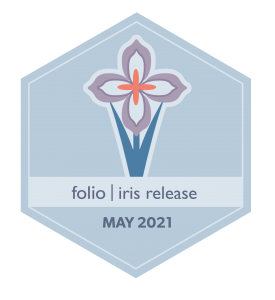
The FOLIO community announced the first release of 2021, Iris, on Friday, April 30th. Iris introduces a new app for the integration of the remote storage product, Demantic, which is used by University of Chicago for their remote storage. This is a first step to integrating Duke’s remote storage software, CaiaSoft. Also included in Iris is support for EDIFACT invoices, and integration with OCLC’s Connexion software. The Single Record Import integration using Connexion was developed by our hosting partner, Index Data, and was supported by Duke, the University of Chicago, and Cornell. You can find more details in the Iris Release Notes.
Local Project Updates
Data Migration from Aleph to FOLIO continues. We’ve been able to test the migration of budgets and orders recently. We are working on how to provide the initial allocation for the budgets. The daily patron loader we use in Aleph is now running in our FOLIO test instance, and we’ll be migrating existing Aleph-only patrons such as Friends of the Library, guests, etc. this summer. A fresh load of bibliographic, holdings, and items from Aleph to our test server was run the week of May 10th so that we can make final configurations and do training on the Courses app, which we’ll be launching in just a few weeks!
The Training Development and Delivery Team has hosted the first two sessions of the Introduction to FOLIO: Searching, Filtering, and Navigation course to designated superusers. Initial responses were positive to the course, so we’ll continue developing courses as laid out by our draft course curriculum. We can’t wait to share the training with all the staff!

We spent the month of April working to determine the features we need in the upcoming Kiwi release (on top of all the other FOLIO work!). The community agreed to give each institution 100 points to distribute among their highest ranked features. In the FOLIO issue tracker (using Jira), each institution ranks each feature on a scale from one to five, with one being the most important. Duke currently has around 250 rank one features. Our project manager reviewed each of the 250 features and noted the highest priority of those. Our implementation teams then reviewed the features in their area and narrowed the list down to a total of about 25. We distributed our 100 points among those and reported them to the community ballot. The community Capacity Planning Team will then take the highest ranked features and work to assign development teams and product owners to develop those features and include them in the Kiwi release.
The Kiwi release is important to Duke because that’s the release on which we’ll base our training curriculum and use for training staff.
International Project Updates
Along with the Kiwi pointing process, the community has been working to implement a new governance model. We’ve had a Product Council and a Technical Council over the years, and they have shepherded the functional and technical development respectively. We’ve recently added a Community Council which will focus on building the community, handling the budget, and manage elections for the Product and Technical Councils. Duke’s Dracine Hodges, Associate University Librarian for Technical Services, was elected to the Community Council. Voting for the Product and Technical Councils will take place this summer.
Two of our peer institutions are planning to go live this summer, Texas A&M, and Cornell. The University of Chicago is launching the ERM-focused apps, and plans to launch a full FOLIO implementation later this year. Having these large research institutions live on FOLIO is a great test for the product, and Duke will be able to learn a lot from their implementations. The community’s Implementer’s Group meets every week to discuss features and issues that affect implementation, share demonstrations, and welcome the Capacity Planning Team to share the work they’re doing on each release.
The community Special Interest Groups have been working on documentation over the last few months. The result is a new documentation portal which houses general user documentation for FOLIO. Duke will be developing documentation for our local workflows, and this documentation portal is a great place to start to understand how FOLIO workflows were designed.
Watch This
The community’s Reporting Special Interest Group presented recently on reporting with the Library Data Platform. They introduced a new reporting app that is linked to the LDP and will allow users to be able to view reporting data quickly and through the FOLIO interface. Duke staff will recognize Angela Zoss, who is now convening the Reporting SIG.
Bee Facts
Looking to reduce the use of plastic for your food storage? Consider using a beeswax wrap instead of plastic wrap or plastic bags. Wraps are available commercially or can be made yourself.
FOLIO@Duke Newsletter v. 2 no. 3
Honeysuckle Release
Honeysuckle was released to the public on December 1, 2020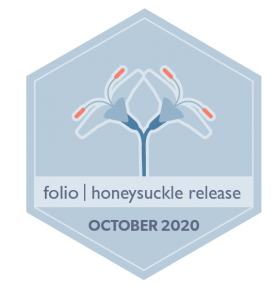 . Some new features include a circulation log, fast-add for Inventory records, a department field in the user record, and updates to Finance structure. Visit the Honeysuckle Release Notes for full details. We’ve requested that our development and test environments be upgraded to Honeysuckle in December and we’ll keep you posted on progress.
. Some new features include a circulation log, fast-add for Inventory records, a department field in the user record, and updates to Finance structure. Visit the Honeysuckle Release Notes for full details. We’ve requested that our development and test environments be upgraded to Honeysuckle in December and we’ll keep you posted on progress.
After the Honeysuckle release, the international project agreed to move to three releases per year, aiming for releases in March, July, and November. Iris will be the first release in 2021.
Local Project Updates
In November, the User Permissions Working Group sent out a survey to staff who supervise Aleph users. The supervisors were asked to submit one survey for each type of role they supervised. The survey included questions such as “What Aleph modules does this role use?”, “What functions are performed by this role in the Cataloging (or Acquisitions or Circulation} module?”, “Does this role use ARC or reports from ARC?”, and “Does this role run Aleph services?”. The User Permissions Working Group appreciates all the responses they received. They will review the results over the next two months and the survey will help to inform permission sets in FOLIO.
The Data Working Group reviewed and mapped information for loading existing orders into FOLIO and what information was needed to start loading loans. Active loans in FOLIO will need to use the new FOLIO circulation rules to be checked out to patrons during the migration, so a few of the most-used circulation rules have been configured as well to test the process. We’ve made great progress in our “data first” push to get large chunks of different data into our local FOLIO instance and have bibliographic/holdings/items, patrons, and organizations (vendors) loaded. Orders, loans and courses data have been mapped and are ready for the development team to code the migrations. We decided that we likely will not migrate budgets from Aleph, and DUL is going to take this opportunity to review our existing budget structure. Requests and Fees/Fines are left to be mapped for migration, but will need circulation policies in place first.
In the new year, we’ll kick off the creation of some basic training courses, and we’ll start a mini-project to implement the Courses module, with the intention of being able to use FOLIO Courses for the Duke Summer Sessions. We’ll also work on creating a budget structure for FOLIO, and continue work on circulation rules.
Watch This
On December 2, there was a FOLIO Forum held on the Open Library Foundation’s YouTube channel. This will be a panel discussion with Cheryl Malmborg, product owner for Circulation Rules and Policies, and a number of institutions who are using FOLIO in production will talk about and demo their rules.
There will be an open Q&A with the panel from the Circulation Rules Forum on December 7 at 8:00am Eastern. The Zoom meeting will require the universal FOLIO meeting password. Please contact any member of Library Systems and Integration Support if you would like that password.
Bee Facts
With the holiday baking season upon us, consider a recipe that highlights  honey! Perhaps Chewy Honey Oatmeal Cookies, Honey Brown Butter Blondies, or a Honey Apple Gingerbread Cake.
honey! Perhaps Chewy Honey Oatmeal Cookies, Honey Brown Butter Blondies, or a Honey Apple Gingerbread Cake.
FOLIO@Duke Newsletter v. 2 no. 2
Duke is using FOLIO apps in production!
As of July 7, Duke is using FOLIO apps in production! The ERM implementation team is using the Licences and Organization apps.

International Project Update
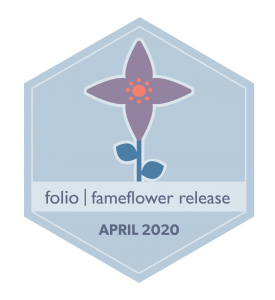
The international project released Fameflower in April. Some feature highlights include work for e-resources, licences and agreements, batch import and export updates for MARC data, work on the Courses app, and work on accessibility.
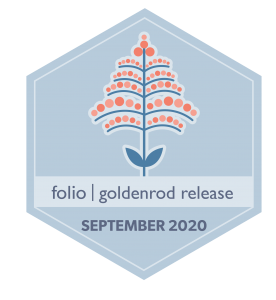
Goldenrod was released at the end of July. That release includes a new lightweight MARC editor app called QuickMARC, more features for the batch import and export, more features for resource and e-resource management, updates to patron notices and work to implement custom fields. We’ve been upgraded to Goldenrod on all three of our Duke instances, and are working to add the additional functionality into our data loads.
Local Project Update
Working Through a Pandemic
Throughout the pandemic this year, our Implementation Teams and our Working Groups have continued to meet and to move forward with work on FOLIO. We had already set up online meetings for all teams, use of the FOLIO Project wiki, and Box for shared documents, so a transition to working from home and meeting online was pretty smooth for our local project. The project members have made great strides on our local implementation, and I thank everyone for their hard work to keep this project going amidst all the extra work the pandemic has thrown at us.
Timeline for Q3 and Q4 2020
In May, the members of the local project worked through another ranking exercise to help the international project plan the rest of 2020. Once we reviewed with the plan for 2020, we took a step back and decided to delay Duke’s full implementation of FOLIO another year, aiming at Summer 2022.
We will spend the rest of 2020 working to get samples of all the different kinds of data into our test instance. The majority of our bibliographic, holdings, and item records have been loaded into the Inventory App and Source Record Storage on our test server. Loading of patron records from the Duke Identity Management feed is expected in September. Following that will be data for Finances (budget), Courses, Orders, Invoices, Loans and Requests.
Progress from the Implementation Teams and Working Groups
Working Groups
The Configurations Working Group led a pair of small groups. One focused on how we would like to map our Aleph locations (institution, sublibrary, collection) to the four levels that FOLIO offers (institution, campus, library, location). The other small group discussed FOLIO material types and loan types. In Aleph, our item statuses are labeled as a mix of loan periods and material types (3-hour, 7-days, bound periodicals, microform). The decisions for locations, material types, and loan types are very important because they affect how items are mapped during migration, as well as how loan policies may be written in the future.
The Data Working Group completed the mappings of bibs, holdings, and items from Aleph to FOLIO. They’ve also completed the mappings for patron records. This group is leading the data-first focus for the rest of 2020.
The Documentation and Training Working Group has also prepared a survey that will be sent to all library staff to determine how best to plan FOLIO training. We want training to be a success and for all staff to feel as comfortable as possible with their tasks when we go live with FOLIO.
The Permissions Working Group discussed how best to consider roles or permission sets for staff in FOLIO. They have prepared a survey that will be released to supervisors in late October.
The Reporting Working Group investigated a number of different software options to be a staff interface for the Library Data Platform. It is possible that there may be a reporting app included with FOLIO. That would have an effect on what the Reporting Working Group recommends.
The Testing Working Group investigated use of an application to help keep track of testing and test cases. Members also took part in the international project’s Bug Fest to test new releases.
The Workflows Working Group worked on creating a document template that will allow the Implementation Teams a standard format to record their input and output workflows.
Implementation Teams
The Electronic Resources Management (ERM) Implementation Team worked through a complete project on their own and implemented the Agreements and Organizations Apps in production in July! They are continuing to work on additional features and integrations.
The Metadata Management Team worked with the Data working group to complete the mapping of bib/hol/item records. There was a request from the international project to rank issues regarding Authority Records, which they completed. They are currently working on mapping the 9xx fields.
The Resource Access Team worked to review current reports they use and to document their reporting requirements and considered our current patron statuses for mapping and creation/consolidation of new patron groups.
The Resource Management Team worked is continuing with mapping of Aleph vendor records to the Organizations App. Moving to FOLIO will offer the opportunity to reconsider the current budget structure and codes and serious thought is being given to that topic.
Watch This
Folio Forum on the Library Data Platform
What’s new in Inventory and QuickMARC app demo
Bee Facts
Sir David Attenborough explains on the Smithsonian Channel’s YouTube channel how bees communicate where to find new flowers with the most nectar.
https://www.youtube.com/watch?v=LU_KD1enR3Q
Duke FOLIO Forum February 19 2020
On Wednesday, February 19, we held our quarterly Duke FOLIO Forum. This quarter, we presented about the Edelweiss release, the time lines for both the larger project and our local implementation, shared information from WOLFcon20, and Erin Nettifee gave a tour of the FOLIO Project site on the Duke Wiki.
International Project Update
Edelweiss was released on January 10. This release has added 89 new features, and thanks to the FOLIO Bug Fests, fixed a record number of bugs! We have about 10 staff on the list for testing in the FOLIO Bug Fests, and they’re
bringing the skills they’ve learned back to our local implementation project. Many thanks to our testers!

The international FOLIO project continues on with scheduling the remaining features that need to be added. The libraries that are planning to go live this summer with a sub-set of FOLIO applications have created lists of the minimum functionality required for them to go live. The product owners are working with the lists to match Jira issues to the functionality. The group of libraries and the functionality needed can be found on the Round II list. The list includes Duke’s adoption of the ERM functionality. There are lists being curated to account for the needs of the libraries going live in 2020 with the MVP, and those (including Duke) going live in 2021 with the full implementation. You can find those lists on the FOLIO wiki under the Implementers Group; Working Groups section.
Duke sent 11 representatives to WOLFcon20 hosted by Texas A&M. We reviewed the schedule ahead of time with the intention of getting to as many FOLIO sessions as possible. On top of the usual special interest group meetings, a company called Arkivum partnered with EBSCO, and gave a plenary session on their product, Perpetua. Perpetua is a digital preservation system, which uses the FOLIO codex to search and connect with repository software and special collections. The plan is to release that software as open source in the future. About 10 staff from Shanghai Public Libraries attended WOLFcon and spoke about their plans to create a circulation app based on the FOLIO architecture to be able to handle 100 million circulation transactions a year! The sheer size and number of libraries and borrowers that the Shanghai Public Library system handles is mind-boggling. A few of the Chinese representatives reached out to Duke staff to learn more about our implementation plans and requirements. An interesting addition to this WOLFcon was presentations about how institutions are actually interacting with FOLIO. Chalmers gave a presentation on their support structure for both local bugs and bugs that need to be reported back to the larger project. The Data Migration SIG representatives from Index Data, Chicago and Texas A&M presented on how they’re loading data and the issues they’re running into. And the Accessibility SIG demonstrated the progress they’re making on ensuring FOLIO meets Web Content Accessiblity Guidelines 2.1 AA and has VPAT certification. WOLFcon21 will be held in Hamburg, Germany.
Local Project Update
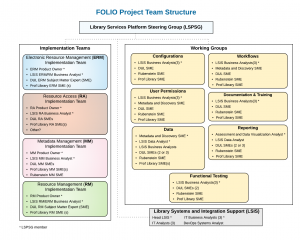
The LSP Steering Group held a kickoff meeting on January 8 for our local working teams to meet, learn about their roles on the teams, and more specifics on how the teams will work together.
Our local instance, hosted by Index Data, is up and the local project team members have access to it. At the moment, there’s minimal configuration and no data. We’ll be working with Index Data to get our Aleph data imported. They’ll also be available to help the project teams with implementation support and custom development. Index Data is also supporting FOLIO implementations for the University of Chicago, Lehigh University, and the Fenway Library Organization (FLO). We’ve already scheduled a standing meeting with Index Data and the other institutions they’re supporting so we can share local updates, work on common issues, and learn from each other.
Our local timelines are becoming more concrete as our local teams have started meeting. The ERM Implementation Team will be meeting with the Configurations Working Group in March to go over the configurations needed for the Licences app, and possibly the Agreements and eUsage apps. They’ll need to work with the User Permissions and Workflow Working Groups in early Spring to set up and test permission sets, and to understand the local workflows. Also this spring, the Configurations Working Group and the Data Working Group will be hosting a series of meetings to discuss how Duke will implement FOLIO’s four-level location hierarchy.
Finally, Erin showed us around the FOLIO project node on the Duke Wiki. Duke Staff will need to log in to see everything, as it’s not all open to the public.
We look forward to seeing you at the next Forum! Date and time coming soon.
Slide deck: Duke FOLIO Forum 2020219, Speaker notes
FOLIO@Duke Newsletter v. 2 no. 1

In this issue:
Duke FOLIO Forum Date and Time
Steering Group Update
Watch This
Bee Facts
Save The Date – Upcoming FOLIO Forum
Duke FOLIO Forum
February 19, 2020
10:00 a.m. – 11:30 a.m
Korman Assembly Room (Perkins 217)
Steering Group Update
On January 8, we gathered about 60 library staff who will be serving on the teams as we implement FOLIO here at Duke. We viewed a slide deck talking about the implementation timelines (ERM and the full implementation), reviewed the roles people will fill on the teams, and some basic team behaviors and norms. The larger group then broke into teams to schedule their first meeting and to review the team charters. Some teams even had time to do some brainstorming on tasks the teams should complete (for example, a glossary of terms). Members of the Duke University Libraries Executive Group attended as well to show support for the project. Teams will keep minutes from their meetings on the FOLIO project wiki. Duke staff, make sure you log in!
From January 22-24, eleven staff members of the Duke University Libraries and the David M. Rubenstein Rare Books and Manuscripts Library attended WOLFcon at Texas A&M University. WOLFcon is a gathering for members of the Open Library Foundation (OLF) and the open source software communities that are a part of OLF, including VuFind, ReShare, Coral, GOKb, and FOLIO. Local staff attended meetings regarding all parts of FOLIO, from the apps for functional areas (check-out, organizations, inventory, etc.), to discussions leaning more toward the technical (data loading, performance, accessibility, etc.).
Watch This
WOLFcon Plenary, Day One – January 22, 2020
Learn some history about Texas A&M University, and hear from David H. Carlson,
Dean of University Libraries
Bee Facts
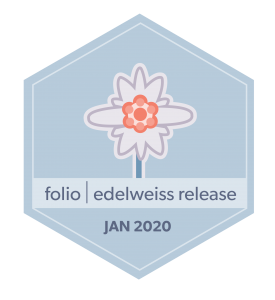
More about Edelweiss, the flower for which the most recent version of FOLIO was named.
Duke FOLIO Forum November 20 2019
On Wednesday, November 20, we held our second quarterly open forum for Duke Libraries’ staff. We shared updates on the international project, heard from members of three of the FOLIO special interest groups (SIGs), and an update on the project plan and timeline of Duke’s implementation.
Dracine Hodges led us off with an overview of the international project, starting with the advantages of FOLIO’s platform and it’s features. She shared an updated FOLIO development timeline that extends to the fourth quarter in 2020. 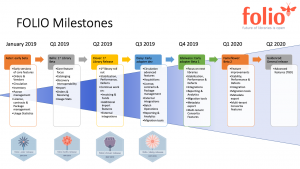 We celebrated Chalmers’ being the first to launch FOLIO in production. And we learned more about the commitments other institutions have made and when they’re planning to launch FOLIO in their production environments.
We celebrated Chalmers’ being the first to launch FOLIO in production. And we learned more about the commitments other institutions have made and when they’re planning to launch FOLIO in their production environments.
FOLIO’s Round 2 early adopters are:

FOLIO@Duke Newsletter v. 1 no. 6

Upcoming Duke FOLIO Forum
Steering Group Update
Watch This!
Bee Facts
Duke FOLIO Forum
November 20, 2019
9:30 a.m. – 11:00 a.m
Korman Assembly Room (Perkins 217)
Agenda:
Update on international FOLIO project
Lightning Talks by members of international FOLIO project Special Interest Groups
- User Management
- Reporting
- Data Migration
- Other Special Interest Groups
Duke’s updated timeline
Approach to implementation
Questions
Steering Group Update
Over the past month the Steering Group has been discussing how to tackle the tasks we’ll need to complete for implementation of the ERM-focused apps in the third quarter of 2020, and the rest of the FOLIO apps in third quarter 2021. Historically, we’ve focused on our functional areas with a team for circulation, one for cataloging, and one for acquisitions. We know that each one of those areas affects the others, and are very aware that we need to facilitate discussions on those cross-functional areas with appropriate subject matter experts. We’ve been discussing how to set up the working groups to accomplish that. We’ll be sharing more at the Duke FOLIO Forum on November 20.
